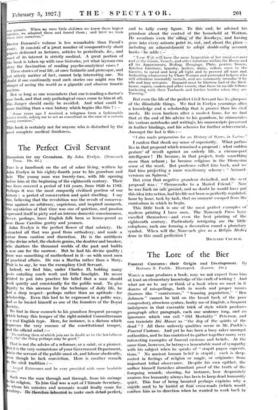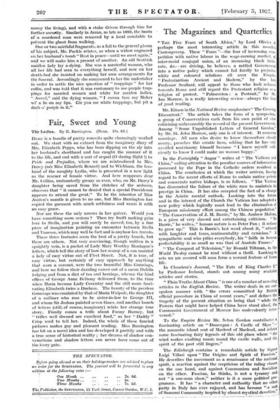The Lore of the Bier
Funeral Customs : their Origin and Development. By
BertraM. S. - Puekle. Illustrated. (Laurie. 1613.) Wims,a man produces a book, may we not expect from him at least an elementary knowledge of the craft of writing ?. And what are we to say or think of a book when we meet: in it dozens of misspellings, both in words and proper names (horrors like " camiverous," "teaming population," " Ben Johnson" cannot be laid on the broad back of the poor . compositor); atrocious syntax, faulty use of-English, a frequent indulgence in that execrable trick of style which produces paragraph after paragraph, each one -sentence long, amid an • ignorance which can call "Old Mortality" Peterson, and. can translate Di!: _Manes as "the day of the spirits of the dead" ? All these unlovely qualities occur in Mr. Puck le's Funeral Customs. And yet he has been a busy raker amongst . authorities, and he has contrived to gather together many very interesting examples of funeral customs and beliefs. At the same time, however, lie betrays a lamentahle_want of sympathy with his subject when he speaks of '' stupid pagan supersii_ tions." No ancient human belief is stupid ; each is deep_ rioted in feelings of religion or magic, or originates from ithi"ortant tribal observance. Despite his own epithet, the author himself furnishes abundant proof of the truth of the foregoing 'remark,— showing, for instance, how desperately anxious live humanity always has been to keep dead humanity quiet. This fear of being haunted perhaps explains why a Xnjeide. usect:_t<:, be bilrid at four' crossroads (Which would confuse him as to when he .wanted to work back t0 annoy the living), and with a stake driven through him for further secwity. Similarly in Anna, as late as 1889, the boots of a murdered man were removed by a local constable to prAvent the ghost from walking. One or two mirthful fragments, as a foil to the general gloom of his subject, Mr. Puckle relates, as when a widow engraved on her husband's tomb "Rest in peace—until we meet again," and we will make him a present of another. An old Scottish maiden lady lay a-dying. She was a masterful woman, who all, her life had seen to everything herself, and now on her death-bed she insisted on making her own arrangements for the funeral. Accordingly she summoned to her the undertaker in order to settle the nice question of " trappings " for her coffin, and was told that it was customary to use purple trap- pings for married women and white for maiden ladies. "Awed," said the dying woman, "I canna face my Maker wi" a lie on my lips. Gie you me white trappings, but pit a
dash o' purple in it." •



























































 Previous page
Previous page